On Jan. 26, 2021, Janet Yellen assumed the role of Treasury Secretary of the United States, the first woman ever to hold the country's purse strings in her competent hands. As International Women's Day approaches on March 8th, this news is worth celebrating.
However, Yellen didn't climb her way to the top of the financial world alone, and unfortunately, her rise doesn't mean women have finally achieved financial equality with their male partners, coworkers, and neighbors.
Yellen's ascent was built on the groundbreaking and often overlooked work of women throughout history who fought for control over their own finances. These women faced ridicule and scorn as they sought for their place on Wall Street, in the board room, and in the halls of government.
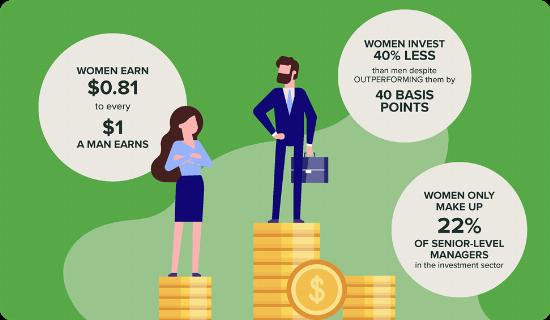
Women have come a long way, but we still have miles to go to reach equality in regards to pay and representation. We live in a world where women still earn $0.81 to every dollar a man earns. Where they invest 40% less than men despite outperforming them by 40 basis points. Additionally, men continue to dominate the financial industry, with women making up only 22% of senior-level managers in the investment sector, according to Catalyst Research.
Though these statistics may seem disheartening, it's worth remembering that women have come a long way to get where they are today, and the next generations of women are poised to move farther ahead still.
In celebration of International Women's Day, we're looking at some of the underappreciated women who were extremely successful in Wall Street and business.
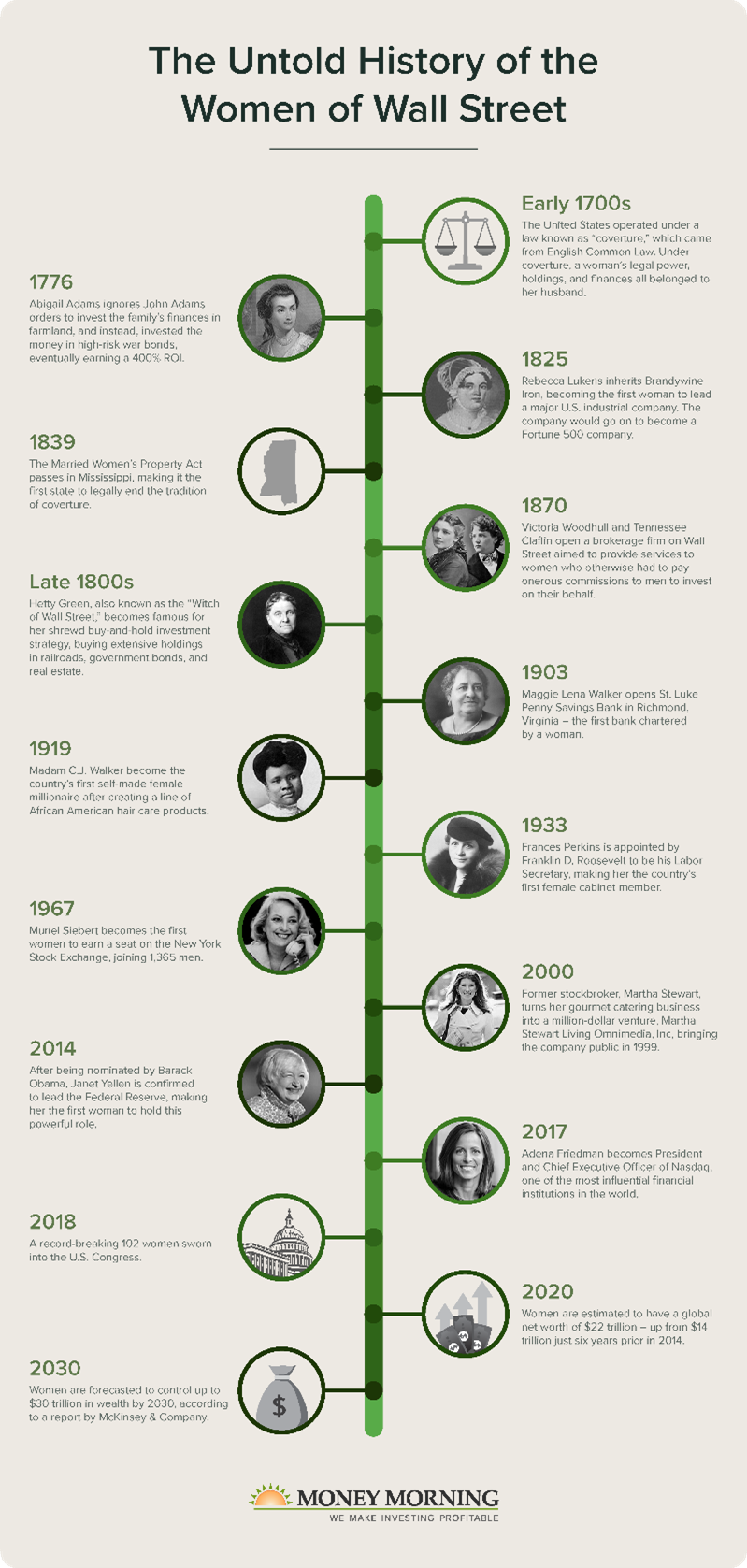
Women and Finance in the 1700s
The Founding Fathers dreamed of a country where all men were created equal. In those days, the nascent United States operated under a law known as "coverture," which came from English Common Law. Under coverture, a woman's legal power, holdings, and finances all belonged to her husband.
Despite being essentially powerless in the eyes of the law, some strong-willed women still managed to exercise their financial smarts and make a profit as a result.
1776: Abigail Adams Invests in High-Risk War Bonds
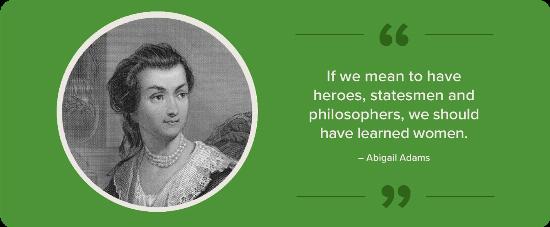
History has relegated Abigail Adams to the role of the country's second First Lady. However, Adams was a wise, strong, and savvy person in her own right. Not only was she one of the earliest advocates for women's rights and abolishing slavery, but she is also popularly considered the country's first female investor.
During the Revolutionary War, John Adams entrusted the family's finances to his wife, ordering her to invest the money in farmland. Abigail promptly ignored her husband's wishes and instead invested the money in war bonds, which were considered highly risky at the time. Yet, the Continental Army prevailed, and historians suggest that Adams was able to rake in a 400% return on her investment.
Women and Finance in the 1800s
The dawn of the 1800s found women in a similar situation to the 1700s. They couldn't vote, sign contracts, or own property. In essence, they still had no legal standing outside of their husbands. But over the course of the century, the call for women's rights grew louder and louder. (The Seneca Falls Convention was held in 1848.)
Also, during this time, women found creative ways into the men's-only financial clubhouse. For example, even though women were banned from buying stocks, many simply paid commissions to men to invest on their behalf... that is until two enterprising women opened their own brokerage firm. Here's a look at some of the most impressive women and movements that wouldn't be stopped by the prejudices of the time.
1825: Rebecca Lukens Becomes the First Woman to Lead a Major U.S. Industrial Company
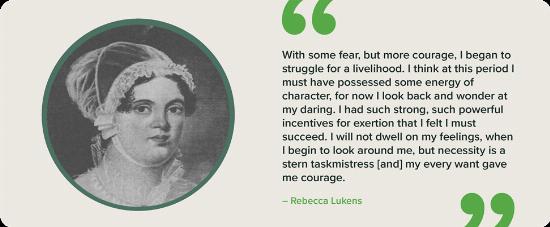
When Rebecca Lukens inherited Brandywine Iron, she became the first woman to lead a major U.S. industrial company. Through grit, strength, and an eye for innovation, Lukens was able to build the company throughout her lifetime and even persevere through the financial panic of 1837. The company would go on to become a Fortune 500 company until the 1990s.
1839: The Married Women's Property Act Expands the Rights of Ownership to Married Women
By passing The Married Women's Property Act, Mississippi became the first state to legally end the tradition of coverture and expand rights of ownership to married women. Mississippi's action would trigger a wave of similar laws throughout the country.
1870: Victoria Woodhull and Tennessee Claflin Open a Brokerage Firm on Wall Street
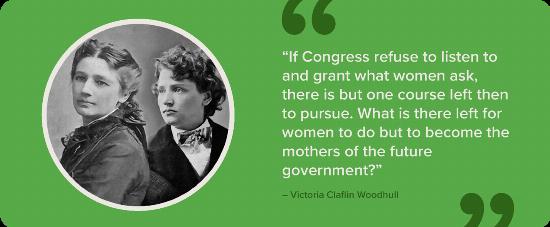
Victoria Woodhull never let her gender stop her. Along with her sister, Tennessee Claflin, she opened a brokerage firm on Wall Street aimed to provide services to women who otherwise had to pay onerous commissions to men to invest on their behalf. Though many considered the venture a joke or publicity stunt, the brokerage firm was a financial success. Woodhull would soon go on to become the first woman to run for president... even though women were not yet allowed to vote!
Late 1800s: Hetty Green Becomes Known for Her Shrewd Buy-and-Hold Investment Strategy
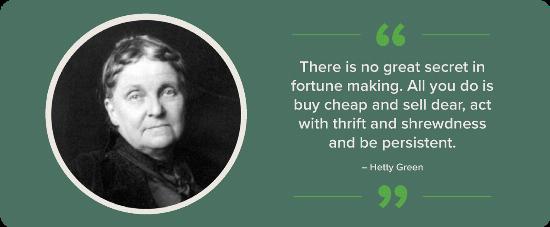
Perhaps the "Witch of Wall Street" earned her spooky nickname for the black clothes she wore. Or perhaps it was because of her eerie ability to dramatically expand her wealth. Hetty Green was an heiress who took a keen interest in business and finances as a child. She became famous for her shrewd buy-and-hold investment strategy while many others were swept up in rampant and ruinous speculation. She bought extensive holdings in railroads, government bonds, and real estate. She also made many loans, including a notable $1 million loan to the city of New York. Upon her death, she left an estate worth more than $100 million.
Women and Finance in the 1900s
The 1900s swooped in with a growing movement for women demanding to receive the vote. Women agitated for full ownership of their lives, control over their finances, and a say in the government of their country.
In 1920, women won the right to vote nationwide through the passage of the 19th Amendment, but the fight for equality was far from over. During World War I and World War II, women rose up in droves to support the war effort, selling bonds, working in factories, and even taking the place of men on the stock floor. (They were quickly banished again after the men came home.)
These early decades saw the rise of courageous and impressive women. The financial power of women and their demands for equality continued to grow in the second half of the century, supercharged by the feminist movement of the 1960s and beyond. These decades saw women flood into the workforce and begin climbing up the corporate ladder, even in the male-dominated investment sector. Women also started to make their way into the halls of government. Even with all this progress, women still struggled against discrimination, unequal pay, and existing power structures dominated by men.
1903: Maggie Lena Walker Opens the First Bank Chartered by a Woman
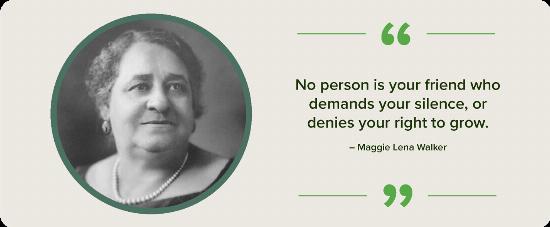
The daughter of slaves, Maggie Lena Walker opened St. Luke Penny Savings Bank in Richmond, Virginia. It was the first bank chartered by a woman. The bank lasted throughout the 1900s and even into the next century as the country's longest bank to be continually owned by African Americans. Throughout her life, Walker encouraged African Americans to open their own businesses and harness their economic power. She inspired many women to enter the banking field.
1919: Madam C.J. Walker Becomes the Country's First Self-Made Female Millionaire
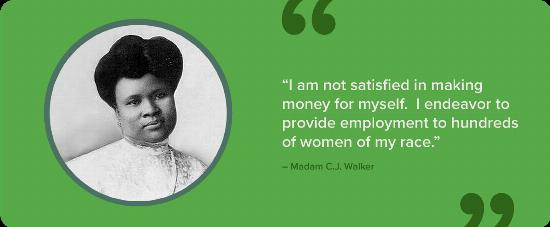
Walker was born Sarah Breedlove to recently freed slaves, then was orphaned as a young girl. She did not let an impoverished and abusive childhood hold her down. She suffered from a scalp disorder, which sent her on a journey of hair care experimentation to help her condition. Out of these experiments grew a line of African American hair care products. Now using the name Madam C.J. Walker, she traveled the country selling her products. All her hard work paid off. The Madam C.J. Walker Manufacturing Company was a wild success and turned Walker into the country's first self-made female millionaire.
1933: Frances Perkins Becomes the First Female Cabinet Member
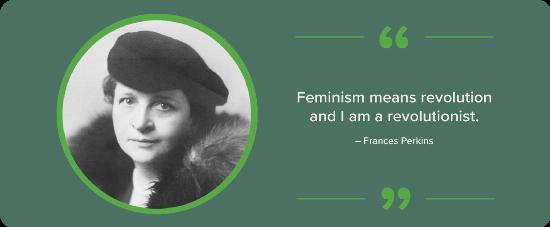
An incredibly hard worker, Frances Perkins earned a master's degree in social economics from Columbia University in 1910 and spent the early part of her career working on a variety of prestigious committees for the State of New York. In 1933, she was appointed by Franklin D. Roosevelt to be his Labor Secretary, making her the country's first female cabinet member. During her 12-year tenure in the position, Perkins supported a minimum wage, limits on the employment of children, and unemployment insurance. Perhaps her greatest contribution in the role was helping to draft the Social Security Act of 1935.
1967: Muriel Siebert Becomes the First Women to Earn a Seat on the NYSE
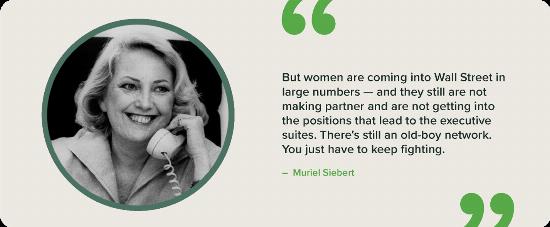
Despite never obtaining a college degree, Muriel Siebert worked her way up in the financial world from entry-level positions to partner. In 1967, she founded her own brokerage firm, Muriel Siebert & Co. To earn a seat on the New York Stock Exchange, she needed sponsorship from a current member as well as the finances to pay the extremely high fees. Siebert faced numerous rejections and struggled to raise the money, but she never backed down. She persevered, and eventually joined 1,365 men when she became the first woman to gain a seat on the New York Stock Exchange.
Women and Finance in the 2000s
The first two decades of the 21st century have seen women climb to the top of corporations and government as well as wield extensive financial power. The corner offices of some of the country's biggest corporations have been filled by Meg Whitman of Hewlett-Packard, Indra Nooyi of PepsiCo, Susan Wojcicki of YouTube, Mary Barra of General Motors, and Whitney Wolf Herd, the 30-year-old founder of Bumble. In government, the year 2018 saw a record-breaking 102 women sworn into the U.S. Congress as well as the first woman, Kamala Harris, elected to be Vice President of the United States in 2020.
Even as women ascend to greater heights than ever before, they still aren't shoulder to shoulder with men, especially when it comes to the financial sector. Today, women represent only:
- 31% of investment advisors
- 23% of CFPs
- 18% of CFAs
- 14% of mutual fund managers
- 12% of venture capital investment professionals
Of course, there have been breakout females in the business and finance world who have had outstanding success, without always getting as much credit as they deserve.
2000: Martha Stewart Becomes the First Self-Made Female Billionaire in the U.S.
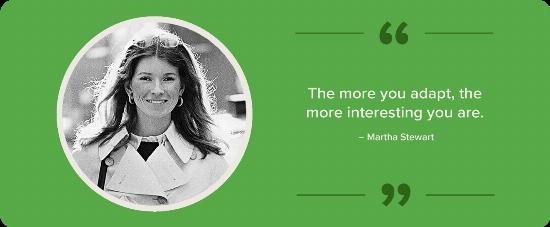
Though Martha Stewart rose to fame by writing cookbooks, publishing a popular magazine, Martha Stewart Living, and hosting a crafty cable show - among many other ventures - Stewart was always a canny businesswoman at heart. Before she took over the DIY home and cooking space, Stewart worked as a stockbroker and built her gourmet catering business into a million-dollar venture. Throughout the 1990s, she continued to grow her brand and her company, Martha Stewart Living Omnimedia Inc., bringing the company public in 1999. One year later, she became the country's first self-made female billionaire. Even a five-month stint in prison for insider trading didn't slow Stewart down. She's back on top and still estimated to be worth over a billion dollars.
2014: Janet Yellen Is Confirmed to Lead the Federal Reserve
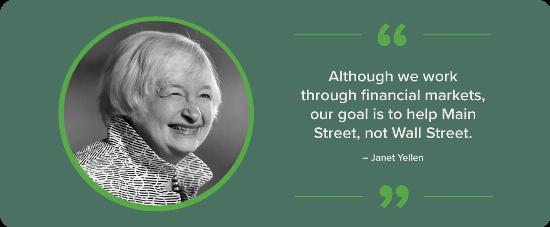
Janet Yellen's impressive resume makes a strong case for placing her in the pantheon of most influential financial thinkers of this new century. After receiving her Ph.D. in economics from Yale, Yellen taught at Harvard University and the University of California Berkley. She followed up these roles by serving as a member of the Board of Governors of the Federal Reserve and then heading Bill Clinton's Council of Economic Advisors.
In 2013, she was nominated by U.S. President Barack Obama to lead the Federal Reserve and was confirmed in January of 2014, making her the first woman to ever hold this powerful role. Yellen helped the country continue its recovery from the 2008 recession. Over her tenure, jobs and wages grew while interest rates remained low. In 2020, Joe Biden nominated Yellen to be the first female Secretary of the U.S. Department of the Treasury, and she was overwhelmingly confirmed in January of 2021.
2017: Adena Friedman Becomes President and CEO of Nasdaq
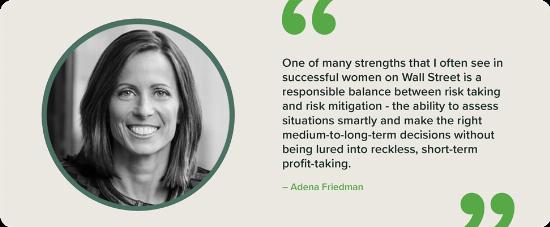
Another glass ceiling in the financial industry shattered in 2017, when Adena Friedman took over as President and Chief Executive Officer of Nasdaq, one of the most influential financial institutions in the world. Friedman previously held many senior roles in the company and served as the chief financial officer of The Carlyle Group, a global investment firm holding $246 billion in assets. Even before her promotion to the head of Nasdaq, Friedman made it on the Forbes list of 40 most powerful people, one spot behind Nancy Pelosi. During her time as the head of Nasdaq, Friedman is credited with growing the company into a leading global exchange.
What Is the Future of Women in Finance?
The list of extremely accomplished women in finance and business is going to keep growing much, much longer. Recent research has found that 63% of Millennial women noted that they were interested in investing in their 20s versus just 28% of Gen X women. Additionally, the financial power of women continues to grow. In 2020, women are estimated to have a global net worth of $22 trillion. That's up from $14 trillion just six years prior in 2014. In fact, women may control up to $30 trillion in wealth by 2030, according to a report by McKinsey & Company.
On International Women's Day 2021, we salute the female pioneers who have paved the way for our current generation, and we encourage today's women to take charge of their financial power.
At Money Morning, we offer investment and financial analysis from real experts, including helpful guides and market insights with actionable takeaways. Join us today as we continue to help everyone achieve financial success.


